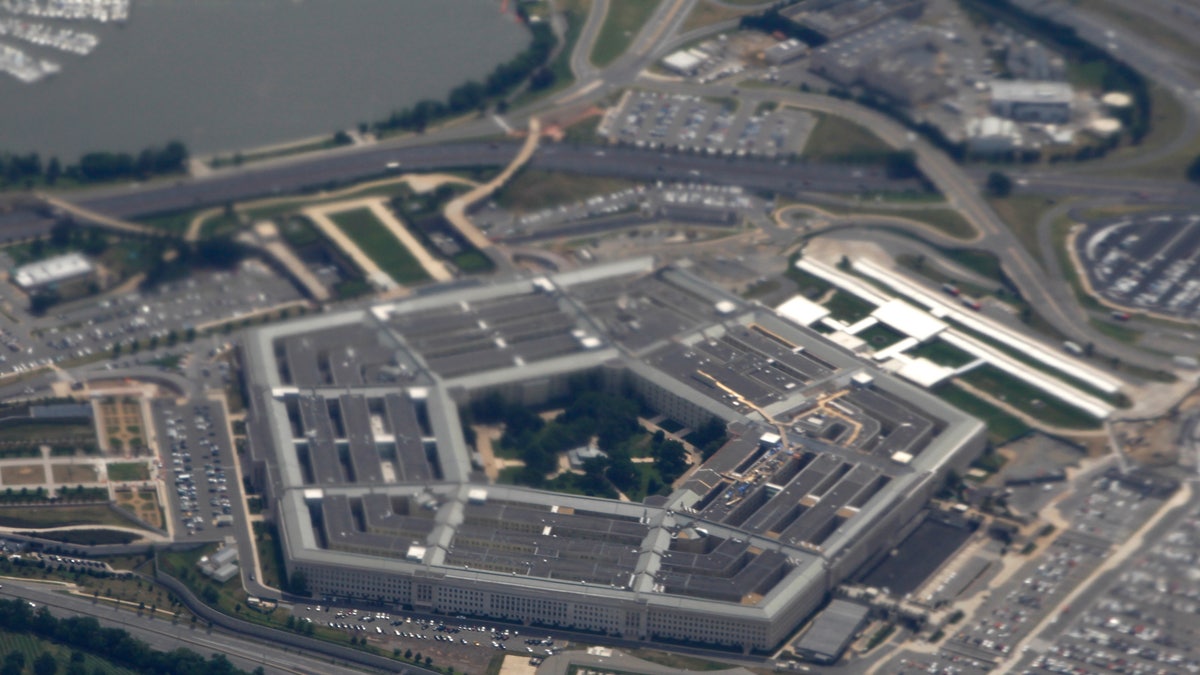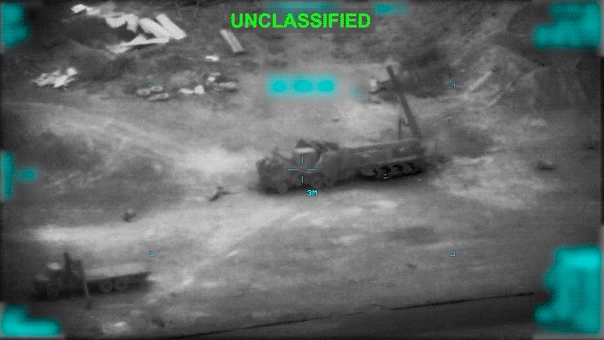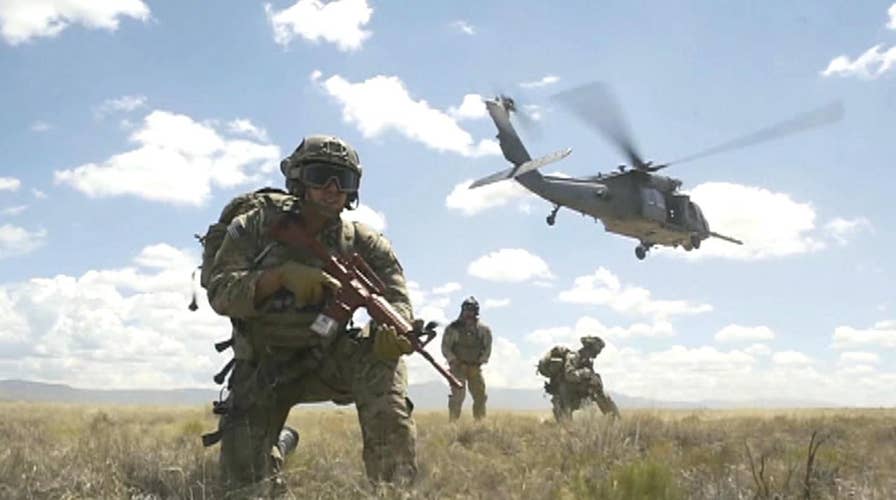US considering deploying additional troops to Middle East
Top Pentagon officials head to the White House for a critical national security meeting on Iran; Lucas Tomlinson reports.
The Pentagon on Thursday presented proposals to the White House at a meeting on sending military reinforcements to the Middle East to beef up defenses against Iran amid heightened tensions in the region, Fox News has learned.
Meanwhile, in comments aired by Iranian state-run media, Major General Mohammad Hossein Baqeri, the Chief of Staff of the Iranian Armed Forces, declared that the U.S. was an "arrogant and pharaonic threat" that invited "all Iranians to enter the fields of jihad, full alert, and the mobilization of more power."
"Our hands are on the trigger and we are firmly prepared to annihilate any aggressor and greedy eyes against the Islamic Iran," Baqueri added.
Acting Defense Secretary Patrick Shanahan told reporters the Defense Department has not yet determined how many troops might be sent to reinforce the existing U.S. military presence in the region.
He disputed reports that the Pentagon was proposing to send up to 10,000 more troops. He said reports citing specific figures were "not correct," but he would not say whether the number under consideration was higher or lower.
“There is no 10,000 and there is no 5,000. That’s not accurate," Shanahan said, explaining that those figures had not been proposed.

Acting Defense Secretary Patrick Shanahan, left, and Secretary of State Mike Pompeo speak to members of the media after a classified briefing for members of Congress on Iran, Tuesday, May 21, 2019, on Capitol Hill in Washington. (AP Photo/Patrick Semansky)
"What we're focused on right now is, do we have the right force protection in the Middle East," he added, referring to defensive forces. "It may involve sending additional troops."
He said he was in regular contact with Marine Gen. Kenneth F. McKenzie, the Central Command chief, about how to shape the U.S. force presence in the Mideast with potential Iranian threats in mind.
Asked whether the U.S. was provoking conflict with Iran, Shanahan countered that the Pentagon was focused on deterring Iran.
"Well, my response is I think they have the same sensitivity as all of us, and that is we want to avoid the risk of Iranian miscalculation," Shanahan said. "I think those are fair comments. Our job is deterrence. This is not about war. We have a mission there in the Middle East."
Some of these additional forces could include more warships to the region with Marines, more Patriot missile batteries, U.S. Army brigades (consisting of roughly 4,000 troops each), or a cruise-missile submarine such as USS Florida, which can hold more than150 Tomahawk cruise missiles.
"Our hands are on the trigger and we are firmly prepared to annihilate any aggressor and greedy eyes against the Islamic Iran."
The USS Florida was last seen in Souda Bay, Greece two months ago at a naval weapons base where bombs and missiles are stored. In 2011, USS Florida fired over 90 Tomahawk cruise missiles into Libya.
It's not clear whether the White House would approve sending all of the troops proposed by the Pentagon, whatever the number. Officials said the proposed troop reinforcements are not a response to any new threat from Iran but are aimed at strengthening security for the U.S. forces already in the region. They said the troops would be defensive forces, and the discussions include additional Patriot missile batteries, more ships and increased efforts to monitor Iran.
WATCH: TRUMP TALKS RISING TENSIONS WITH IRAN
The officials spoke on condition of anonymity because the plans have not been formally announced.
Thursday's meeting comes as tensions with Iran continue to simmer. Any move to deploy more forces to the Middle East would signal a shift for President Trump, who has repeatedly emphasized the need to reduce America's troop presence in the region.

In this June 3, 2011, file photo, the Pentagon is seen from air from Air Force One. Nearly two dozen progressive groups are launching a new push to persuade Democratic presidential candidates to support dramatic spending cuts at the Pentagon. (AP Photo/Charles Dharapak, File)
Secretary of State Mike Pompeo said Thursday Trump was evaluating the force posture in the region "every day."
"We're evaluating the risks, making sure that we have it right," he told "Fox and Friends."
U.S. officials have provided few details about possible Iranian threats but indicated they initially involved missiles loaded onto small Iranian boats. This week officials said the missiles have been taken off the boats near Iran's shore, but other maritime threats continue.
Sending more troops could also raise questions on Capitol Hill. During back-to-back closed briefings for the House and Senate on Tuesday, defense leaders told congressional officials the U.S. doesn't want to go to war with Iran and wants to de-escalate the situation.
Pompeo and Shanahan told lawmakers the U.S. is seeking to deter, not provoke, Iran, even while accusing Tehran of threatening U.S. interests in the Mideast. Shanahan told reporters, "Our biggest focus at this point is to prevent Iranian miscalculation."
Many in Congress are skeptical of the administration's approach to Iran, questioning whether it is responding to significant new Iranian threats or escalating a situation that could lead to war.
WATCH: ANTI-TRUMP FORMER CIA DIRECTOR BRENNAN ATTENDS IRAN BRIEFING
The Trump administration has evacuated nonessential personnel from Iraq, amid unspecified threats the administration said are linked to Iranian-backed militias in the country.

n this Jan. 9, 2019, file photo, released by an official website of the office of the Iranian supreme leader, Supreme Leader Ayatollah Ali Khamenei speaks at a meeting in Tehran, Iran. (Office of the Iranian Supreme Leader via AP, File)
On Sunday, a rocket was fired into Baghdad's heavily fortified Green Zone, landing less than a mile from the sprawling U.S. Embassy. There were no injuries and no group claimed responsibility, but the rocket was believed to have been fired from east Baghdad — which is home to Iran-backed Shiite militias.
Some Democrats say Trump is responsible for drawing Iran's ire. Last year he abruptly pulled the U.S. out of the Iran nuclear deal, negotiated during the Obama administration to prevent Iran from nuclear weapons production, without crafting a coherent strategy for how to combat other Iranian behavior like supporting extremist organizations.
He also has reimposed punishing sanctions that have crippled Tehran's economy, and designated Iran's Revolutionary Guard Corps as a foreign terrorist organization in April.
"I have yet to see any exhibited strategy," said Democrat Rep. Abigail Spanberger of Virginia, a former CIA officer. She said she finds many of the administration's recent statements on Iran to be "deeply troubling."
On Wednesday, Iran's supreme leader publicly chastised the country's moderate president and foreign minister, saying he disagreed with the implementation of the 2015 nuclear deal they had negotiated with world powers.
The extraordinary comments by Ayatollah Ali Khamenei, the first time he's criticized both politicians by name, came a year after Washington's withdrawal from the accord.
Fox News' Lucas Tomlinson and The Associated Press contributed to this report.













































